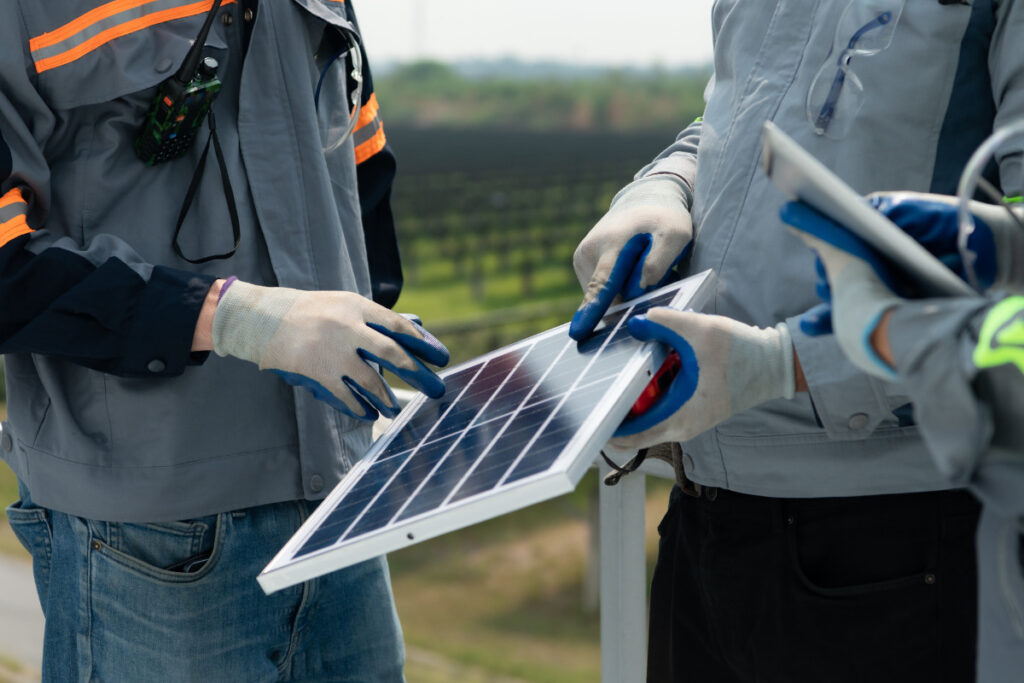Introduction
As the world shifts towards renewable energy, homeowners must adapt and stay informed on the future of home energy storage. We will explore the growing importance of energy storage for homeowners. We’ll also discuss recent advancements that are making these technologies more accessible than ever before.
Energy storage can increase independence from traditional grid sources, reduce costs, and promote sustainable living. Keep reading to learn about these critical aspects of modern home ownership as we usher in a new era powered by clean, renewable energies.

Understanding Energy Storage And Its Importance For Homeowners
Energy storage is essential for homeowners, allowing them to store excess energy from renewable sources such as solar panels. They use them during peak hours, reducing their reliance on traditional energy sources and lowering their bills.
Benefits Of Energy Storage
One of the primary benefits of energy storage for homeowners is increased energy independence. Homeowners can store excess power from their system or other renewable energy sources, reducing reliance on traditional grid-supplied electricity. This allows more control over energy consumption and security to reduce vulnerability to utility rates and disruptions.
Integrating an effective energy storage system can also lead to substantial savings for homeowners. Lower costs of residential systems & green tech reduce monthly utility bills for households. Moreover, some states and utilities offer incentives and rebates to promote adopting these eco-friendly solutions; this effectively lowers initial investment costs while increasing potential returns on investment (ROI). Advanced battery systems enable homeowners to profit from demand response programs by returning stored excess power to the grid.
Furthermore, using clean, stored energy helps reduce greenhouse gas emissions by minimizing dependence on fossil fuels for electricity generation. Combining solar panels with energy storage systems can help homeowners reduce their economic and environmental carbon footprint.
Types Of Energy Storage
Energy storage technologies play a crucial role in advancing the shift towards renewable energy sources and improving the resilience of power grids. Homeowners can choose from various options to meet their unique needs for reliable and sustainable electricity. Here are some prominent types of energy storage:
- Tesla Power Wall: Lithium-ion battery for seamless solar energy storage in homes and businesses.
- Enphase Encharge: Modular energy storage expands easily with more batteries for flexible home solutions.
- Sonnen: Top home battery brand with high-quality components, robust performance, and smart features.
- SolarEdge: SolarEdge offers residential energy storage solutions to integrate with existing solar power systems.
- Franklin: This manufacturer provides various scalable and compact batteries with advanced management features and an impressive life cycle.
Understanding each type’s advantages and disadvantages will help homeowners make informed decisions about investing in an appropriate energy storage system.
The Role Of Energy Storage In Reducing Reliance On Traditional Energy Sources And Supporting Renewable Energy
Energy storage is essential for transitioning from traditional energy sources to renewable energy, providing reliable backup, and mitigating intermittency. In essence, it acts as a buffer that helps maintain grid stability when wind or solar power generation fluctuates due to changes in weather conditions. For example, Tesla Power Wall and SolarEdge have developed battery systems to store excess renewable energy for later use.
As more homeowners choose to invest in clean electricity generated through solar panels or other renewable resources like wind turbines, they face challenges related to variability in production. Energy storage solutions help mitigate these concerns by storing surplus power and releasing it when needed. This supports increased renewables adoption and allows homeowners greater control over their consumption patterns – reducing their reliance on traditional energy providers with high carbon emissions. Furthermore, advanced technologies such as Enphase Encharge and Sonnen’s ecoLinx facilitate the seamless integration of renewables with home energy management systems, ensuring optimal performance without straining existing infrastructure.
Overall, robust energy storage technologies contribute to accelerated growth within the renewable sector while empowering individuals towards increased self-sufficiency and sustainable practices – an indispensable element toward achieving global decarbonization goals.
Advancements And The Future Of Energy Storage
Advancements in battery technology, integration with smart home technology, and increased affordability of energy storage systems signal a bright future for renewable energy sources and the role that they will play in powering homes.

Integration With Smart Home Technology
Advances in smart home technology are revolutionizing the way homeowners interact with their energy consumption. Energy storage systems can now integrate seamlessly with intelligent devices, allowing greater control over how and when energy is used throughout the day. For example, a homeowner could set specific times to charge their Tesla Power Wall or Enphase Encharge system during off-peak hours when electricity prices are lower.
Furthermore, pairing energy storage with a home automation system like SolarEdge or Franklin can increase efficiency. These systems can monitor a household’s overall energy production and usage levels down to individual appliances, providing real-time feedback on how much energy each uses and suggesting ways to optimize usage patterns for maximum savings. As electric companies move towards time-of-use tariffs that incentivize customers to shift usage habits away from peak demand periods, these integrated systems will become increasingly attractive options for cost-conscious consumers looking to reduce their carbon footprint while saving money on utility bills.
Advancements In Battery Technology
Advancements in battery technology have played a crucial role in the rise of energy storage. In particular, Lithium-ion batteries, which are commonly used for portable electronics like smartphones and laptops, have become increasingly popular for home energy storage systems due to their high energy density and long lifespan. However, researchers are exploring new chemistries and materials that could improve lithium-ion batteries’ capabilities.
One promising advancement is solid-state batteries, which use a solid electrolyte instead of a liquid one. These batteries could offer higher energy density and safety over traditional lithium-ion batteries while being more environmentally friendly. Another innovation is flow batteries, which use two separate tanks of electrolytes that can be pumped through a cell stack to create electricity. This technology can potentially store large amounts of renewable energy cheaply.
Overall, these battery technology advancements promise to enhance solar energy storage and its impact on homeowners’ lives by improving efficiency, reducing costs, and increasing affordability. Several leading companies, such as Tesla Power Wall, Sonnen, SolarEdge, etc., already offer new solutions for residential customers leveraging these advancements in their homes with reliable technologies.

Increasing Affordability Of Energy Storage Systems
Gone are the days when energy storage systems were considered a luxury only available to wealthy homeowners. Thanks to advancements in technology, energy storage systems have become more affordable and accessible than ever before. This has led to a rising demand for clean and renewable energy options among environmentally-conscious homeowners who want to take control of their energy usage while reducing their carbon footprint.
Costs involved in purchasing and installing an energy storage system have decreased significantly due to decreasing battery costs, enhanced manufacturing processes, and increased competition from new market entrants such as Franklin’s Battery Energy Storage System. As a result of these enhancements, homeowners now have access to various high-quality options like Tesla Power Wall, Enphase encharge, Sonnen, and SolarEdge, which offer long-term cost savings on electricity bills while positively impacting the environment.
How Energy Storage Impacts Homeowners
Energy storage impacts homeowners in various ways, including increased energy independence, reduced costs, lower energy bills, improved resilience during power outages, environmental benefits, and reduced carbon footprint.
Increased Energy Independence
Energy storage systems such as Tesla Power Wall, Enphase encharge, Sonnen, SolarEdge, and Franklin can help homeowners increase their energy independence. These smart home technologies allow homeowners to store excess solar energy generated during the day for use at night when electricity is more expensive. Homeowners can reduce their reliance on traditional power sources by relying less on the grid and more on stored energy.
For households in regions like the Northeast and Midwest with higher space-heating demands and greater energy consumption, incorporating solar-plus-storage technology into their homes reduces utility bills while ensuring an uninterrupted electricity supply during blackouts. Furthermore, Equinox Storage by SunPower lets you store excess solar energy for full or partial-home backup in case of outages. With advancements in battery technology making these systems increasingly affordable, it’s never been easier for homeowners to achieve increased energy independence while also contributing to efforts to reduce carbon footprints worldwide.
Reduced Costs And Lower Energy Bills
One of the most significant benefits of energy storage for homeowners is the reduced costs and lower energy bills. By storing electricity generated by renewable sources like solar panels, homeowners can reduce their reliance on traditional power grids, which often come with high energy costs. In addition to reducing monthly bills, energy storage also provides a more stable source of power when demand on the grid is high.
For instance, let’s consider Tesla Power Wall, an innovative energy storage system that stores solar-generated electricity during daylight hours and makes it available at night or during peak demand. This reduces reliance on utility companies and helps save money in the long run by reducing overall consumption from traditional power grids. With advancements in battery technology and the increasing affordability of these systems, many homeowners are adopting energy storage as an effective way to save money while ensuring a reliable source of electricity for everyday use.
By investing in affordable yet sophisticated home-energy management systems such as SolarEdge or Enphase Encharge that offer battery-backup options, homeowners can avoid expensive installation projects while enjoying lower energy bills year-round. As we move towards a sustainable future where homes are powered by clean and renewable sources of energy rather than fossil fuels, adopting efficient home-energy habits through smart investments will help us reduce our environmental footprint and pay off financially over time.
Improved Resilience During Power Outages
Energy storage solutions can provide a significant advantage during power outages, particularly with solar energy systems. With the increase in frequency and intensity of natural disasters, such as hurricanes and wildfires, having backup power is becoming more critical for homeowners. These technologies ensure that homes can still access electricity even if the grid goes down.
Energy storage solutions like Tesla Power Wall, Enphase encharge, Sonnen, SolarEdge, and Franklin work by storing excess energy generated from solar panels or other renewable energy sources. When no sunlight or low light conditions is causing a blackout or brownout event, homeowners can use the stored electricity to keep their essential appliances on. These devices allow homeowners to be better prepared for unexpected events without relying solely on traditional power sources.
Investing in an energy storage solution will improve your home’s resilience and reduce energy bills while reducing your carbon footprint. Coupled with smart home technology like monitoring apps and intelligent controls, they are easier to use than ever. As battery technology continues to advance and prices continue to drop due to increased demand for solar coupled with battery storage solutions, these advancements give us hope that residential microgrids powered by renewables may soon become an achievable reality for millions of Americans who are willing prosumers looking for affordable modern safety measures against potential blackouts caused by extreme weather events such as fires, floods or storms.”

Environmental Benefits And Reduced Carbon Footprint
One of the most significant benefits of energy storage for homeowners is its ability to reduce their carbon footprint and promote a greener environment. By storing excess energy generated by renewable sources like solar panels or wind turbines, homeowners can reduce reliance on traditional fossil fuels contributing to greenhouse gas emissions. This reduces their environmental impact and supports the global effort toward sustainable living.
Additionally, with advancements in battery technology and the increased affordability of energy storage systems, more people are likely to adopt these solutions and join the fight against climate change. In fact, a recent study found that solar energy generates significantly lower greenhouse gas emissions than fossil fuels. With policies promoting renewable resources and eco-friendly technologies, we can create a cleaner planet one home at a time.
Ultimately, using energy storage options allows homeowners to take control of their environmental impact while reducing costs and increasing independence from traditional power sources. Evaluating options such as Tesla Power Wall, Enphase Encharge, Sonnen, SolarEdge, and Franklin, among others, carefully before selecting any option is important when considering their environmental impact.
Considerations For Homeowners Deciding On Energy Storage
When deciding whether to invest in energy storage for their home, homeowners should consider the following factors:
- Energy Needs: Homeowners must evaluate their current and future energy needs to determine whether energy storage is viable. Factors such as peak demand, power outages, and energy costs all play a role in this decision-making process.
- Cost: The cost of an energy storage system, including installation and maintenance, can be significant. Before deciding, homeowners must consider their budget, available incentives, and potential long-term savings.
- Battery Chemistry: Different types of batteries have different lifetimes, safety risks, and performance characteristics. It’s important for homeowners to research battery chemistries and choose one that best fits their needs.
- Compatibility with Solar Systems: Homeowners planning solar panels must ensure compatible energy storage.
- Maintenance Needs: Like other home equipment, energy storage systems need maintenance. Homeowners should consider upkeep before deciding.
- Warranty: Check warranties for energy storage systems before buying – some cover battery only, others cover battery and inverter.
- Brand Reputation: Homeowners must research reputable brands for reliable products and customer service.
Homeowners should consider energy storage options to make informed decisions that will benefit themselves and the environment.
Evaluating Energy Storage Options For Homeowners
Homeowners have several energy storage options, such as Tesla Power Wall, Enphase Encharge, Sonnen, SolarEdge, and Franklin. Evaluating each system’s specifications and capabilities can help them choose the best one for their needs.
Tesla Power Wall
Tesla Powerwall is a popular home battery storage option that has revolutionized the concept of energy storage. It allows homeowners to capture and store solar or grid energy for later use, reducing reliance on traditional energy sources. The Powerwall comprises lithium-ion batteries similar to those used in electric vehicles, making it a powerful and efficient option.
One significant advantage of Tesla Powerwalls is that they offer increased energy independence for consumers. With access to stored power, homes can continue running during outages or periods of high demand without relying on the grid. Additionally, the Powerwall’s ability to store excess solar energy during daylight hours reduces electricity bills and carbon emissions.
While cost may be a consideration for some homeowners, the benefits far outweigh any initial investment. With advancements in smart home technology and the increasing affordability of battery systems, renewable energy options are becoming more accessible.
Enphase Encharge
Enphase Encharge is one of the top energy storage options for homeowners looking to reduce their reliance on traditional energy sources. The battery system uses solar panels to store excess energy generated during peak sunlight hours. This stored energy can be used later during high consumption or power outages. With Enphase home solar batteries and storage, homeowners can protect themselves from blackouts and ensure uninterrupted access to electricity.
Enphase Energy Ensemble integrates solar microinverters, power grids, energy storage, and an external generator. The Enphase ensemble maximizes renewable energy production while minimizing its carbon footprint resulting in lower annual electricity bills. Moreover, Encharge battery system reduces reliance on fossil fuels by using solar-generated electricity. Incorporating an Enphase Encharge system can improve emergency resilience and reduce costs.
Sonnen
Sonnen offers intelligent battery solutions tailored to store and manage energy for homes in a safe and efficient manner. The ecoLinx energy storage system, fully integrated into households, provides backup power and manages loads to ensure no power is wasted. A study evaluated Sonnen’s home system’s demand and energy impacts for whole-home and solar photovoltaic data as the baseline.
The EAC Energy Storage Group uses Sonnen’s technology to predict the future electric grid with many energy storage options. Homeowners in North Carolina can also take advantage of Sonnen’s various grid-related services through their customizable options available. With these benefits, homeowners looking for an efficient way to store excess electricity should consider Sonnen’s products.
SolarEdge
SolarEdge is one of the energy storage options homeowners can consider when evaluating their needs. This home battery provides 9.7 kWh of backup capacity. With this capacity, homeowners can save power for peak demand by storing unused solar energy in the SolarEdge battery.
In addition to its impressive storage capacity, SolarEdge also integrates seamlessly with Smart Home Technology through its monitoring platform. This platform allows homeowners to track and control their energy usage remotely, giving them greater control over their consumption and savings. Furthermore, SolarEdge’s home batteries reduce reliance on traditional energy sources, providing environmental benefits and reducing carbon footprints.
Franklin
Franklin is a company that specializes in evaluating energy storage options for homeowners. They have studied the economics of battery energy storage and how it impacts homeowners. Recently, Franklin unveiled an advanced energy storage system integrating more critical loads than competing systems with built-in reliable backup.
The effects of deep reductions in energy storage costs on homeowners have also been examined by Franklin. Their expertise offers insights for informed homeowner decisions on options like Tesla, Enphase, Sonnen, SolarEdge, and advanced systems. Storage Futures and the Energy Storage Program by NYSERDA are just some of the programs studied by Franklin. They aid homeowners in achieving energy independence and reducing their environmental footprint through solar panels and efficient power management.
Conclusion
In conclusion, energy storage is the next big thing in sustainable and affordable power for homeowners. With advancements in battery technology, integration with smart home devices, and decreasing costs can revolutionize energy storage.
Solar storage boosts independence, cuts carbon, and offers backup power with options like Tesla, Enphase, Sonnen, SolarEdge, and Franklin. As we move towards a greener future with renewable energy sources becoming more economical each day, investing in an affordable yet high-quality system could be one of the best decisions you’ll make for yourself and our planet’s future!
Go solar with DroneQuote
At DroneQuote, we believe in empowering homeowners with the knowledge and tools to make informed decisions about going solar and energy storage. Our innovative technology and expert team provide personalized quotes and recommendations that help you save money and reduce your carbon footprint. Whether you’re new to solar or looking to upgrade your system, we can help you find the best solutions for your home and budget. So why wait? Take the first step towards a brighter, more sustainable future today and join the thousands of homeowners who have switched to solar with DroneQuote. Sign up now to get started!
